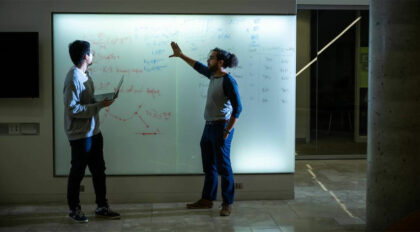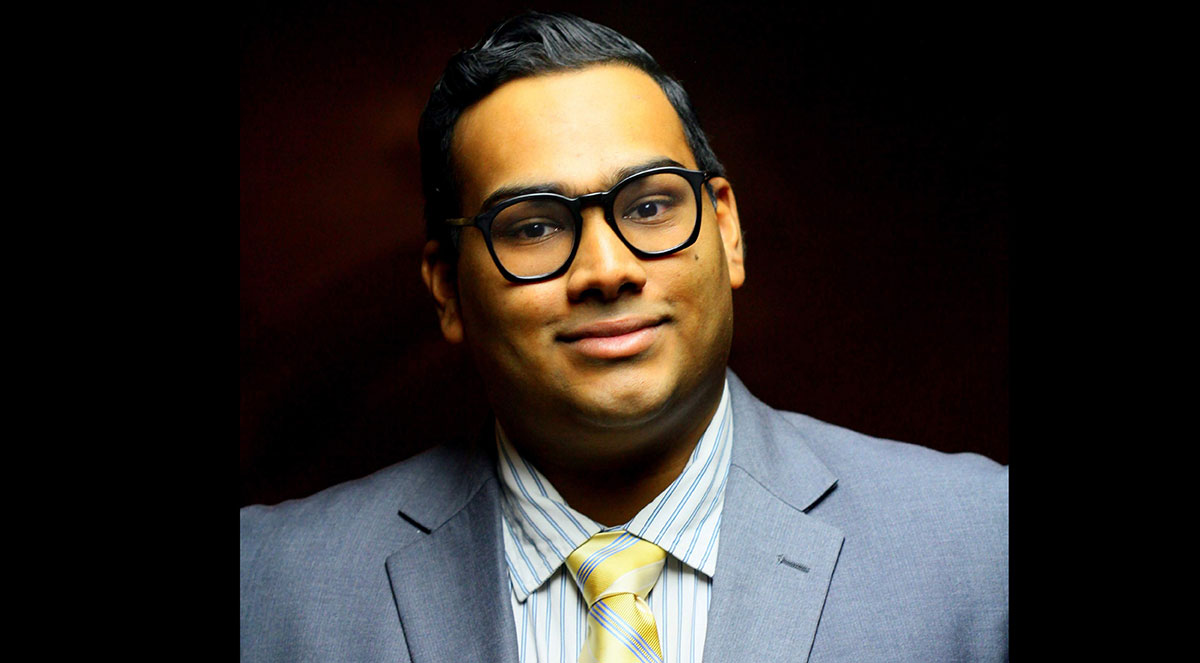National security work grows out of scientific expertise
There comes a time for many postdoctoral scholars when they have to make a life-changing decision: Do I go into private-sector work? Do I become a professor? Do I stay at the lab bench, immersed in science?
Former Morgridge postdoc Amritava Das found himself at that juncture, weighing his options back in 2021. He considered an offer to work for a biotech startup and sent out a half-dozen applications for faculty positions.
“There are intellectual parts of being a faculty member that are very appealing. And then there is the daily grind of the job itself, writing grant applications,” Das says. “I found applying for faculty jobs to be tiring. Some people send out 40 or 50. I thought the fatigue setting in at six was problematic.”
Das, whose interdisciplinary work at Morgridge straddled biomedical engineering and bioethics as it relates to patient care, had been developing a need to take his career beyond the theoretical realms of science.
“I wanted to get off the bleachers and get onto the field,” he says. “I wanted to be on the pragmatic end of it. Intellectually, I’ve always been interested in the empirical.”
That’s when he applied for, and won, an AAAS Science and Technology Policy Fellowship – the first ever at the U.S. Department of the Treasury. During a year at the agency, he worked with the Committee on Foreign Investment in the United States, reviewing financial transactions involving foreign investments in the U.S.
“They were very interested in some of training I had that helped me articulate risk in a very organized way,” Das says, adding that the job demands a high degree of technical and strategic knowledge.
That experience led Das to Washington, D.C.-area career in defense contracting.
Das, who was born in Rochester, N.Y. but moved with his parents to India at age 2, had a family that prioritized education. After two years at a college in India, he transferred to the University of Manchester in England where he obtained a master’s in chemical engineering.
During his undergraduate years, Das recalls a close family friend’s reaction when he mentioned that he might not pursue a PhD. “She said, ‘But if you don’t do a PhD, people will think you’re illiterate.’ It’s just a thing you’re supposed to do.”
“The Morgridge fellowship allowed me to see a vast, scientific world outside of biology and engineering, which I don’t think I would have seen otherwise.” Amritava Das
At UW-Madison, Das earned a doctorate in chemical and biological engineering and became a Morgridge postdoc working with Kris Saha, Christian Capitini, and Pilar Ossorio.
His experience was diverse. In bioethics, he worked to understand how clinical trial investigators navigate dual roles as physicians and scientists. At the same time, in biomedical engineering he was developing mathematical models for understanding outcomes from gene therapy and studying production of new CAR-T cells for treating cancer.
“The term I’ve used to describe my experience at Morgridge is ‘intellectual whiplash,’” he says. “I was switching between doing gene editing experiments, immunology experiments and working in bioethics. But it ended up being a fascinating 4½-year intellectual journey.”
After his Treasury fellowship ended, Das took a job as a senior consultant with 11th Hour Service, a Department of Defense contractor. In that role, Das analyzed military supply chains – notably minerals and textiles.
“A lot more than weapons are sourced by the military. The job gave me a great idea of the workings of the U.S. government, understanding how the Department of Defense works, and the critical role it plays in the U.S. economy,” Das says.
In late 2024, Das took a job as senior expert control analyst at American Systems, another defense contractor. In that role, he investigates foreign direct investments in the U.S. to determine if adversarial nations are making investments in firms and technologies that could affect U.S. national security.
Das says his work at Morgridge, while it seems far afield from his work today, built relevant, valuable competencies.
“It was a postdoc experience that was designed for wide-ranging interdisciplinary intellectual curiosity. There was a high degree of intellectual fulfillment that carries over,” Das says. “The Morgridge fellowship allowed me to see a vast, scientific world outside of biology and engineering, which I don’t think I would have seen otherwise.”

Rising Sparks: Early Career Stars
Rising Sparks is a monthly profile series exploring the personal inspirations and professional goals of early-career scientists at the Morgridge Institute.
